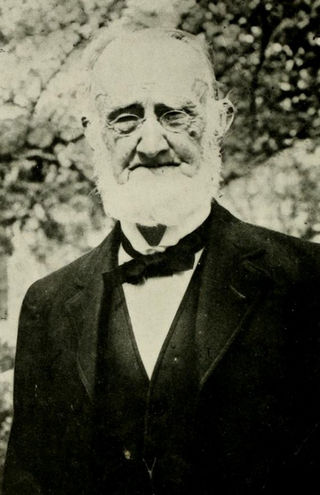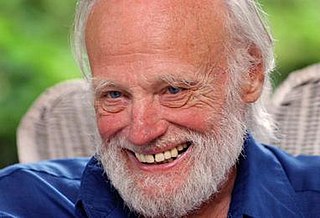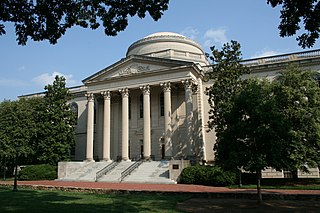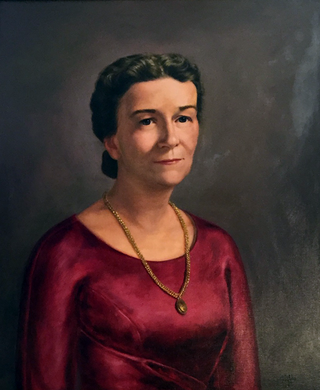
The University of North Carolina at Chapel Hill is a public research university in Chapel Hill, North Carolina. Chartered in 1789, the university first began enrolling students in 1795, making it one of the oldest public universities in the United States.

Frank Porter Graham was an American educator and political activist. A professor of history, he was elected President of the University of North Carolina at Chapel Hill in 1930, and he later became the first President of the consolidated University of North Carolina system.

Kemp Plummer Battle was an American lawyer, railroad president, university president, educator, and historian. He served as North Carolina State Treasurer and as president of the University of North Carolina in the nineteenth century.

John Marsden Ehle, Jr. was an American writer known best for his fiction set in the Appalachian Mountains of the American South. He has been described as "the father of Appalachian literature".
Howard Washington Odum was an American sociologist and author who researched African-American life and folklore. Beginning in 1920, he served as a faculty member at the University of North Carolina, founding the university press, the journal Social Forces, and what is now the Howard W. Odum Institute for Research in Social Science, all in the 1920s. He also founded the university's School of Public Welfare, one of the first in the Southeast. With doctorates in psychology and sociology, he wrote extensively across academic disciplines, influencing several fields and publishing three novels in addition to 20 scholarly texts. He was white.

The Southern Oral History Program (SOHP), located in the Love House and Hutchins Forum in the historic district of Chapel Hill, North Carolina, is a research institution dedicated to collecting and preserving oral histories from across the southern United States.

Sturgis Elleno Leavitt (1888–1976) was the Kenan Professor of Spanish at the University of North Carolina, the author of many books on Spanish language and literature, the president of several Spanish language teaching organizations, an adviser to the U.S. State Department and for many years the chairman of the Southern Humanities Conference as well as editor of the Hispanic Review.

Louis Round Wilson was an important figure to the field of library science, and is listed in "100 of the most important leaders we had in the 20th century," an article in the December 1999 issue of American Libraries. The article lists what he did for the field of library science including dean at the University of Chicago Graduate Library School, directing the library at the University of North Carolina Chapel Hill, and as one of the “internationally oriented library leaders in the U.S. who contributed much of the early history of the International Federation of Library Associations and Institutions.” The Louis Round Wilson Library is named after him.
John Sprunt Hill was a North Carolina lawyer, banker and philanthropist who played a fundamental role in the civic and social development of Durham, North Carolina, the expansion of the University of North Carolina at Chapel Hill and the development of rural credit unions in North Carolina during the first half of the 20th century.
Arthur Franklin Raper was an American sociologist. He is best known for his research on lynching, sharecropping, and rural development.

The UNC School of Information and Library Science(SILS) is a professional school at the University of North Carolina at Chapel Hill offering a bachelor's degree in information science, master's degrees in library science and information science, a professional science master's degree in digital curation, and a doctoral degree in information and library science as well as an undergraduate minor, graduate certificate programs, and a post-masters certificate.
Hocutt v. Wilson, N.C. Super. Ct. (1933) (unreported), was the first attempt to desegregate higher education in the United States. It was initiated by two African American lawyers from Durham, North Carolina, Conrad O. Pearson and Cecil McCoy, with the support of the National Association for the Advancement of Colored People (NAACP). The case was ultimately dismissed for lack of standing, but it served as a test case for challenging the "separate but equal" doctrine in education and was a precursor to Brown v. Board of Education, 347 U.S. 483 (1954).

The Louis Round Wilson Library is a library at the University of North Carolina at Chapel Hill. Completed in 1929, it served as the university's main library until 1984. Today, it houses several special collections. The dome rises 85 feet over the university's South Quadrangle.
Joseph Grégoire de Roulhac Hamilton (1878–1961) was an American historian of the South, author, and the founder of the Southern Historical Collection at the University of North Carolina at Chapel Hill, North Carolina, where he spent most of his academic career. He published books and articles about the history of Reconstruction but his most influential role was as an archivist, collecting manuscripts from around the South that form the core of the Southern Historical Collection.
Henry Roland Totten was an American botanist.

The Southern Folklife Collection is an archival resource at the University of North Carolina at Chapel Hill, dedicated to collecting, preserving and disseminating traditional and vernacular music, art, and culture related to the American South. The Southern Folklife Collection is located in UNC's Louis Round Wilson Special Collections Library.

The North Carolina Collection is the largest collection of traditional library materials documenting a single state. It is part of the Louis Round Wilson Special Collections Library at the University of North Carolina at Chapel Hill. The origins of the collection began in 1844 with the creation of the North Carolina Historical Society. The collection formally came into existence after a donation from John Sprunt Hill in 1930 totaling $25,000. The collection includes The Thomas Wolfe Collection and The Sir Walter Raleigh Collection.
The Student Health Coalition (SHC), also known as the Appalachian Student Health Coalition, was an organization founded at Vanderbilt University in 1969 to provide health care to low-income, medically underserved communities in Appalachia, particularly East Tennessee, and later expanded to communities in Nashville and West Tennessee.
Blyden Jackson was a Black American academic, essayist, and activist.
Sarah Graham Kenan was an American heiress and philanthropist. She inherited a third of her sister's share of the Standard Oil fortune in 1917 and established the Sarah Graham Kenan Foundation. Through her foundation, Kenan contributed financially to various institutions including the Episcopal Diocese of East Carolina, the University of North Carolina, Duke University, Saint Mary's School, and the Duplin County Board of Education. Her home, located in the Market Street Mansion District in Wilmington, North Carolina, now serves as the official residence of the chancellor of the University of North Carolina at Wilmington. In 1930, through an endowment she made, the Southern Historical Collection was established at the University of North Carolina at Chapel Hill.











